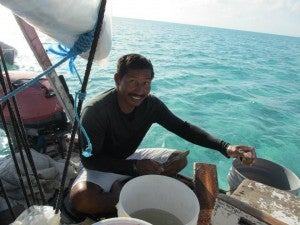
Gumercindo Cano, a Managed Access fisherman, takes the meat out of a conch shell
Photo credit: Heather Paffe
Fishing in the developing tropics looks very different from fishing in the United States. It’s easy to forget that millions of people around the world rely on wild fish for their daily protein and survival, rather than being able to purchase it from a grocery store. This is the case in the countries where EDF will work in partnership with Rare and University of California Santa Barbara (UCSB) on our ‘Fish Forever’ project. Fish Forever will focus on work with communities in the developing tropics to reduce overfishing and implement new guidelines that will allow fisheries to recover and more consistently provide the nutrition that so many depend upon. Part of that work will establish territorial user rights in fisheries (TURFs – called Managed Access in Belize), coupled with no-take reserves (replenishment zones/Marine Protected Areas) to advance sustainable fisheries, empower fishermen and bring those solutions to scale.
I recently returned from a governance committee trip to Belize with our partners, Brett Jenks, President of Rare, and Steve Gaines, Dean of UCSB’s Bren School of Environmental Science and Management and principal investigator for the Sustainable Fisheries Group. This trip was a vital way to connect with the community and government on the ground in Belize and understand the skills that each member of the partnership brings to the table.
The partnership provides an opportunity for EDF, Rare, UCSB and local partners to improve fisheries science and knowledge by using data-poor stock assessments to effectively design TURF-Reserves and use social marketing techniques to inspire the necessary behavior changes for sustainable fisheries management.
During this particular trip, we went to Port Honduras Marine Reserve, which already has a Managed Access system, and Hol Chan Marine Reserve, where the Government of Belize and partners in the Fish Forever initiative have already begun the process of engaging communities for the implementation of Managed Access. By visiting these sites, we saw how important it is to link Managed Access with Replenishment Zones. Fishermen in Managed Access areas will protect the replenishment zone because they benefit from the spillover effect of more fish. The partnership will be coordinating with the Government, The Nature Conservancy, and Wildlife Conservation Society – the three organizations in Belize leading the initiative to expand replenishment zones.
EDF has worked with Belizean fishermen for the past five years to establish managed access pilot sites that are being used as a model for the national expansion. Our success on the ground is a result of hard work and relationship building. We have led several workshops that brought government officials, fishing cooperative leaders, NGO managers, conservationists and scientists together. We are excited to expand on our 5 years of work in Belize by bringing in additional partners that will add valuable skills and expertise to our existing partnerships on the ground to find common solutions for similar fishing nations.
During the trip I saw strong support from Government and the close working relationships with local partners. I am excited to see the coalition partners planning further engagement with communities and developing a strategy for generating support for TURF reserves across the country. The project will operate in several developing tropic countries, and we hope that Belize will be a model for working successfully with fishermen and local governments to establish sustainable fishery solutions.









